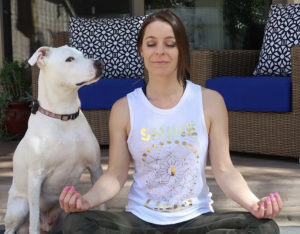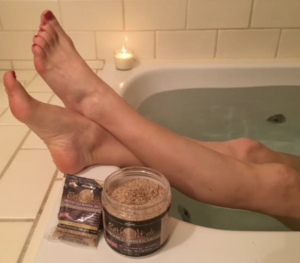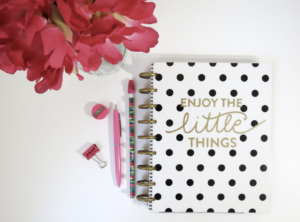
Isn’t it so much easier to manage what goes in our smoothies than the thoughts blending around in our minds?! One of the largest factors of health and how we feel is managing stress, mental health and the symptoms that closely follow. According to my friends at the Huffington Post, an estimated 75 to 90 percent of all doctor visits are for stress-related issues.
I’ll get real with you, I have many wellness pillars down to a science…but – managing stress and overwhelm is something I actively work at. Because as we all know, stress manifests physically, emotionally and sometimes verbally breaking down at Trader Joe’s when they’re out of exactly the almond milk you came in for. Below are a handful of tools I use to keep my cray at bay!
Laughter Is the Best Medicine
Make time for fun, love, and laughter. Laughing is good for your immune system! Whatever makes you bust a gut, do that and then repeat? Hint: Funny movies, stand up comedy clips, silly dancing, playing games with your pet, etc.
Honor Yourself & Have Gratitude
When I coach clients I repeatedly say a healthy lifestyle isn’t only about food. It’s about embracing your inner self, the kid in you and letting go of the mantra, “I don’t have time for this” or “I can wait.” You don’t have to love yoga and adopt a 60-minute meditation to get the health benefits of a healthy life. Writing a list of three things you’re grateful for or trying to sit still and meditate for ten minutes is a great way to start. Take time for you because you’re worth it! Even when things are not how we’d like them to be there are always things to be grateful for. Putting the positive into perspective helps bring our mind to the happy things and in turn, lower stress.
Take an Epsom Salt Bath

Mix 2 cups Epsom salt with hot water and jump in! Or even better add 1⁄4 cup baking soda, and a few drops of lavender essential oil in any oil that makes you think “ahhhh” in a warm tub. I personally LOVE Redmond Bath Salts!
Forgive Yourself. Be Nice To You.
Treat yourself with compassion and forgiveness like you are 7…because that little girl or boy still lives inside of you. Researchers in self-compassion have found many benefits that come from it. Here’s the gist of it applied here:
- When you forget to practice, forgive yourself.
- When you get lost in busy-ness, forgive yourself.
- When you are inconsistent with your daily practice, forgive yourself.
- When your mind wanders incessantly, forgive yourself.
Spend MORE time thinking about what you DID DO than thinking about what you didn’t do. Praise yourself for all the accomplishments big or small.
Practice Mindfulness In A Way That Works For YOU!

Start with the small stuff. Being mindful when you’re eating and actually noticing textures, temperatures and individual tastes. This will make your food more enjoyable and satiating. When you’re playing with your animals really be present with them. In any of these activities follow your breathing and be mindful and present. The point here is don’t feel your practice MUST be a sitting meditation. Practice mindfulness during routine activities.
Remember that the word “mindful” is an adverb that can describe any action you are taking. What are you most motivated to make a regular habit? Mindful walking each morning? Mindful eating of a treat in the evening? Or, mindful breathing outside as you overlook your backyard? Follow your motivation. But, do make note that there is a big difference between “going for a walk” and “mindful walking.”
Use Your Senses
Being mindful is about paying attention to all of your senses. What smells do you notice at your house, the office, outside? What do you hear when you’re in different environments? How do certain clothing feel on your skin and make you feel? What about the energy of other people? The more in tune you are with yourself and the outside world the better you’ll know how to take care of yourself and prevent stress from outside factors.
Put Your Phone Down

Really be present in your environment. If you’re waiting for your coffee, instead of looking at Instagram take in life in the coffee shop. Taking time out of your day to people-watch is an activity that is rooted in mindfulness: You are taking a step outside of yourself and your ego to observe other people in that exact moment in time. Plus, it can be relaxing and you don’t get stuck in the social media mind fuck of comparison.
Other GREAT Ways to Manage Stress:
- Identify the sources of stress in your life. Eliminate environmental factors, people, objects that don’t serve you. De-clutter stuff and people.
- Learn and implement healthier ways to cope with stress.
- Get moving (Put on music and dance. Walk alone with music or enjoying the outdoor noises OR catch up with a fun friend. Take the stairs at work. Park farther away.)
- Connect to others. (Be vulnerable and open. Make eye contact)
- Practice the 4 A’s. 1) Avoid unnecessary stress. 2) Avoid the situation. 3) Adapt to the stressor. 4) Accept the things you can’t change.
- Make time for fun and relaxation.
- Maintain balance with a healthy lifestyle.
Start a (stress) journal

A stress journal can help you identify the regular stressors in your life and the way you deal with them. Each time you feel stressed, keep track of it in your journal. As you keep a daily log, you will begin to see patterns and common themes. Write down:
- What caused your stress (make a guess if you’re unsure)
- How you felt, both physically and emotionally
- How you acted in response
- What you did to make yourself feel better
Which tips will you implement to kick stress and anxiety’s ass?! I’d love to hear. Tweet me or gimme a shout on facebook here: Jill Anenberg Lawrence
__________________________________________

